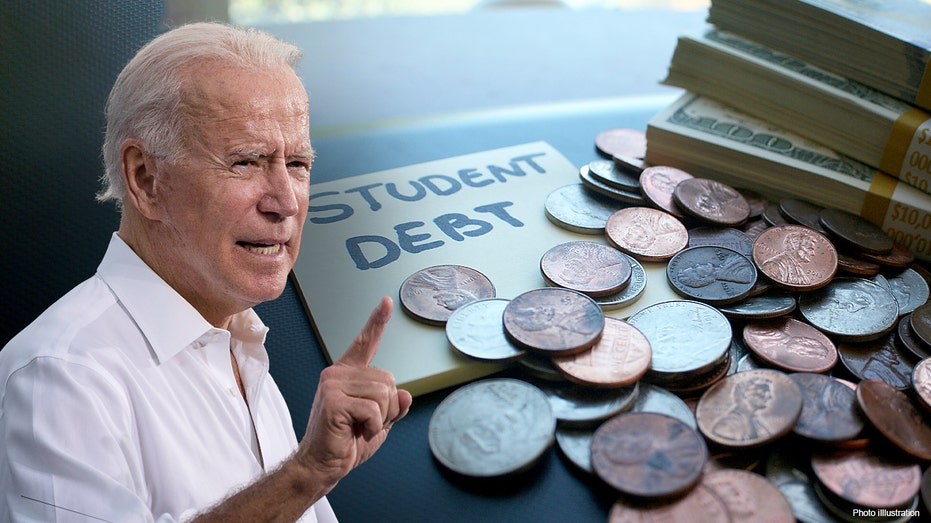Americans school Biden on reality of student loan handouts: 'Someone's going to have to pay'
Supreme Court begins hearing arguments to determine fate of Biden’s student loan forgiveness proposal
Americans torn over taxpayers footing Biden's student loan handout bill
People on the streets of New York City react to the Supreme Court weighing the legality of President Biden's student loan forgiveness proposal.
As the U.S. Supreme Court starts looking more closely at the legality behind President Biden’s proposed student loan handout plan, Americans are voicing their opinions as they weigh the fiscal move’s taxpayer impact.
"I'm currently not a fan because that's just going to make everyone else's taxes higher, because someone's going to have to pay for it," one young person told FOX Business’ Lydia Hu in a man-on-the-street-style "Varney & Co." segment.
Just before the midterm elections, the Biden administration announced a college loan forgiveness plan that would cancel $10,000 in federal student loans for individuals making less than $125,000 per year or households earning less than $250,000 annually as of 2020 or 2021. Recipients of Pell Grants – who typically demonstrate greater financial need – would receive an additional $10,000 in debt cancellation.
Beginning Tuesday, justices will hear a pair of challenges to the student loan debt handout, both of which involve questions about whether the Department of Education was authorized by Congress to advance the rule implementing Biden’s plan and followed the proper regulatory procedures.
SUPREME COURT REVIEWS STUDENT LOAN DEBT HANDOUT PLAN: HOW IT MAY IMPACT YOU
While approximately 43 million student loan borrowers qualify to partake in the plan, the bipartisan Congressional Budget Office has predicted Biden’s student loan handouts would cost taxpayers about $400 billion over the next three years if fully implemented.

President Biden's student loan handout plan will "make everyone's taxes higher because someone's going to have to pay for it," one man told FOX Business' Lydia Hu on the streets of New York City Tuesday. (Getty Images)
"The government should definitely forgive student loans because a lot of people are dealing with a lot of things in life," a second interviewee told Hu, "and the struggle is real out here."
"I don't really think the government can say, ‘Oh, this person doesn't have to pay,’ when the next-door neighbor already paid theirs," an older gentleman chimed in.
Biden has claimed he has the authority to wipe student loan payments under a law known as the Higher Education Relief Opportunities for Students (HEROES) Act, which initially intended to benefit service members deployed to Afghanistan and Iraq by waiving their student loan debt or providing other relief.
Recent college graduate and The Federalist staff writer Evita Duffy argued Biden’s plan doesn’t address the root causes of the college affordability problem.
Biden's student loan handouts are 'welfare for the professional class': Evita Duffy
The Federalist staff writer and recent college graduate Evita Duffy argues Biden's student loan handouts don't address the root of the college affordability problem.
"The administrators at these universities are absolutely out of control," Duffy told "Varney & Co." Tuesday. "There are more administrators than there are professors. They're jacking up the price of education. They make it more difficult for students and professors to go about the day-to-day activities that you want to do."
"Around 50% of Americans don't believe that a college education is worth it," she continued. "When I graduated high school in 2018, I saw that some of my friends went to college like myself. But others said, ‘It's just not worth the cost. I want to save money. I want to start working right away.’ Now those students who made that decision are having to foot the bill for all of the students that went to college. It is welfare for the professional class."
GET FOX BUSINESS ON THE GO BY CLICKING HERE
Steve Moore: Biden's student loan handout was never approved by Congress
Former economic advisor to President Trump Steve Moore and Macro Trends Advisors founding partner Mitch Roschelle weigh in on the Supreme Court hearing Biden's student loan case next week on 'The Evening Edit.'
Student loan repayments remain paused until either 60 days after the Supreme Court ruling is released or 60 days after June 30 – whichever occurs first. It’s possible that Biden could issue a further extension of the repayment pause depending on the outcome of the case.
Supreme Court justices are expected to issue rulings in the student loan debt handout cases later this year, with decisions expected before the current term ends in late June or early July.
FOX Business’ Eric Revell contributed to this report.























